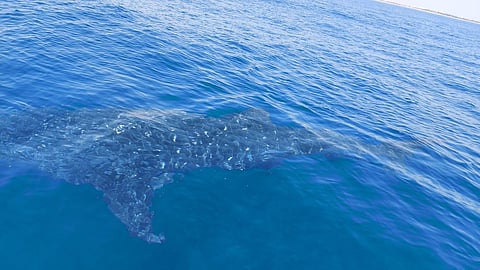

CHENNAI: It was a magical moment for a group of scuba divers on Saturday afternoon. What is a matter of luck even in exotic locations like Maldives, Lakshadweep, Andaman and Nicobar Islands, was witnessed at the Kovalam reef area located 30 km south of Chennai. A giant 'Whale Shark' made a rare appearance and was photographed from a touching distance.
Of late, Kovalam is emerging as an ideal destination for scuba diving, all thanks to artificial reefs deployed in the region by Central Marine Research Institute (CMFRI). The fact that Whale Shark has paid a visit shows that the reef area is healthy and breaming with marine life.
Venkatesh, owner of Ocean Delight Surf and Scuba in Kovalam and the people who organized the drive on Saturday, said: "It was our second drive for the day. We anchored our boat near the reef area and prepared for the drive. Out of nowhere, a huge Whale Shark surfaced beneath our boat taking all us by surprise. This time of year is ideal for diving as the sea is calm and water is crystal clear. We had a clear view of the Shark both from the surface and underwater. All of us swam alongside the gentle giant as long as we could. Clicked a few pictures and videos."
Bengaluru-based professional diving instructor Neha Contractor, who was also part of a diving group, said she had dived in several popular locations across the world, but Kovalam is as good as it gets. "Recently, we went scuba diving in Maldives waters, but didn't find a single Whale Shark. Locations like Maldives, Lakshadweep, Indonesia, Andaman and Nicobar Islands are for big ticket players. But places like Kovalam are less known and need to be popularised and protected. We spent nearly six minutes with the Whale Shark. It's a mesmerizing experience."
Despite their immense size, Whale Sharks pose no threat to humans. They feed by swimming through nutrient-rich water with their huge mouth open, and through a filtration process captures large quantities of zoo- and phytoplankton, krill, roe, small crustaceans, squid and fish.
Joe K Kizhakudan, officer-in-charge of Kovalam Field Laboratory, CMFRI and the person who deployed the artificial reefs in the region 3-4 years back, said the reef area has really matured with good growth of natural corals and plankton. "An assessment conducted recently shows the presence of several commercially viable fishes like snappers, scads, perches, seerfish, seabass, croakers, trevalies and other perches, besides ornamental fishes. Spotting Whale Sharks would be more regular now."
People like Venkatesh deserve appreciation considering the fact that he kept the reef area free of ghost fishing nets and convinced local fishermen not to indulge in unsustainable fishing practices for their own good.